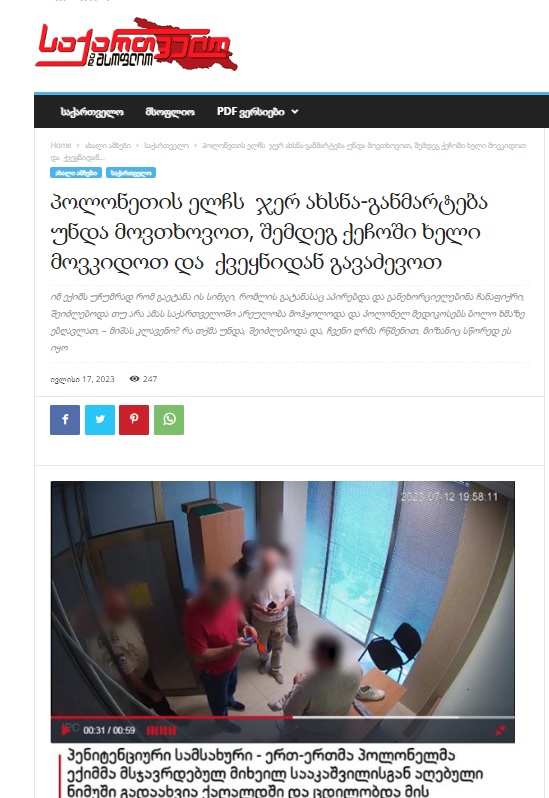For the first time since the implementation of our project, there has been a significant depreciation of Poland’s image in the Georgian media.
On 14 July, the Georgian Special Prison Service released a statement, along with a video, detailing the visit of Polish doctors to Georgia’s third President, Mikheil Saakashvili.
According to the statement, during the visit, there was an “inexplicable incident” involving one of the Polish doctors. The issue concerns the collection of a sample for testing from the convicted Mikheil Saakashvili; the Polish doctor wrapped it in paper and attempted to remove it illicitly.
At the same time, the agency stated that the service had given them the official right to collect the sample. This makes the doctor’s action even more perplexing, as it “adds further ambiguity to the behaviour of the doctor, who engaged in a practice that does not adhere to ethical and legal standards”.
On November 29, 2022, the Minister of Justice – guided by the high level of responsibility with which the state treats the lives and health of prisoners – suggested convicting Mikheil Saakashvili, who had disregarded the recommendations of the attending doctors to invite any foreign doctor from any foreign clinic to involve him in the treatment process.
On March 20, 2023, after nearly four months, the convict’s mother approached the service with a statement that did not meet the standards established by Georgian law. It was repeatedly explained to the applicant in writing and orally that doctors should be allowed to perform medical activities in Georgia temporarily, and other requirements under the provisions of the law should be followed. Despite this, the public was given erroneous information that Polish doctors were allegedly not allowed to visit the convict.
After seven months of the Ministry of Justice’s offer, on July 5, 2023, the convict’s lawyer filed an appeal on the reception of Polish doctors to treat the convicted Saakashvili at the Vivamed clinic. On July 12, their designated doctors were given the opportunity to visit the convict, once again confirming the agency’s commitment to its promise.
However, a letter submitted on July 3 by the same lawyer indicated that the information provided was confidential. However, later, because of one of the TV companies, the public saw the doctors entering the hospital live on a TV channel, where political programmes were being filmed – thus violating the confidentiality of the matter.
The aforementioned incident involving a Polish doctor occurred during the visit. The person was asked to explain this act, for which no logical explanation could be given.
The Polish doctor’s actions were viewed very negatively by the Georgian public. The reaction has been seen on various social networks, forums and in TV interviews. This issue is often met with irony, followed by angry comments. Due to the sensitivity of Mikheil Saakashvili’s case, the motive for Poland’s such active involvement in the former president’s liberation was unclear to many Georgians. In this case, even the anti-government media and Saakashvili’s active supporters preferred not to comment on the Polish doctor’s actions. As for the pro-government media and affiliated groups, they seized the opportunity, analysed the topic and prepared reports on the matter.
General comments from Facebook users and trolls were as follows:
- “It seems that the Poles wanted to use the sample taken from Mikheil Saakashvili for exorcism purposes”;
- “It’s sad that such a delicate case was handed over to a group of unprofessional doctors”;
- “It would be better to entrust this matter to the Americans or Germans to avoid such absurd incidents”;
- “It is much better for Poland to take care of its doctors, who use shoes as laboratory instruments, than to care about a criminal named Mikheil Saakashvili”;
- “Were these Poles doctors or drug dealers?”.
Pro-Russian media have begun to criticise Poland and spread conspiracy theories about Poland’s history, present and future. They also tried (along with pro-government media) to portray Poland as an interested party in Georgian politics that supports Mikheil Saakashvili.
Asaval-Dasavali, Georgia and World, TV Obieqtivi, Alt-Info (all of these media entities openly support Russia) demanded that the government expel the Polish ambassador from the country.
Despite such incidents, Poland’s position and image in Georgia remain very positive and solid, and the incident cannot harm the strategic partnership between Tbilisi and Warsaw (especially in the perception of the mainstream media and Georgian society). The initial criticism disappeared very quickly as it was replaced by other news. The incident did not affect the basis of these bilateral relations. The main reason why the pro-government media indirectly criticised Poland was not to destroy these strategic partnerships with Warsaw, but to isolate Saakashvili’s case from Western interest and involvement.
Author: dr Grigol Julukhidze
Public task financed by the Ministry of Foreign Affairs of the Republic of Poland within thegrant comp etition “Public Diplomacy 2023”
Fot: Natanael Ginting/Shutterstock.com


